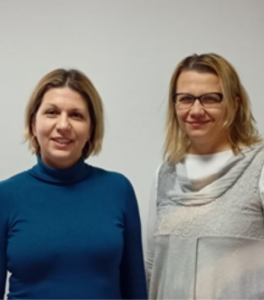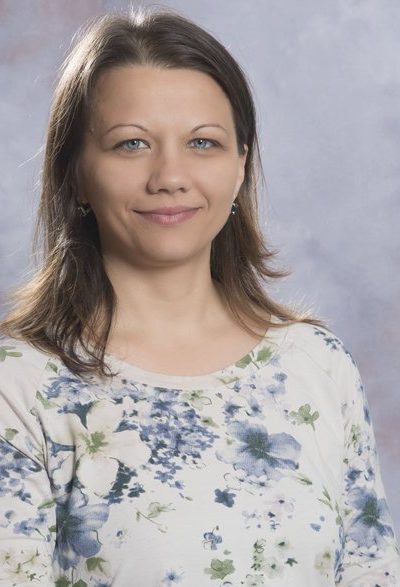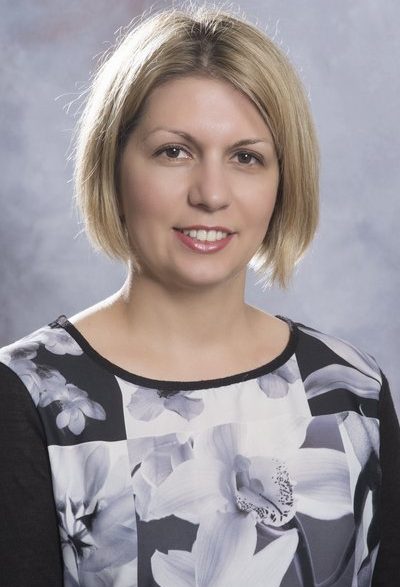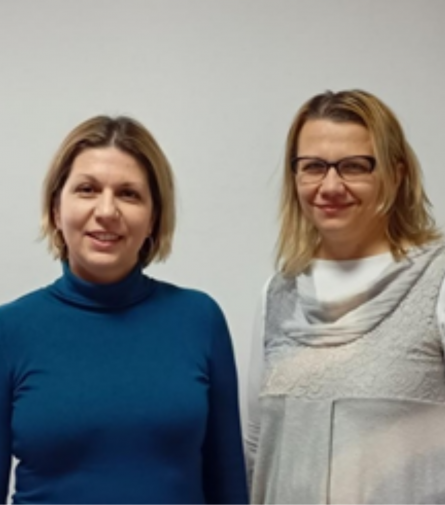2019
Sed mattis ut ligula quis ultricies. Integer vel condimentum enim. Praesent sed aliquet dolor.
2017
Sed mattis ut ligula quis ultricies. Integer vel condimentum enim. Praesent sed aliquet dolor.
Mirela Jukić Bokun and Ljerka Jukić Matić


Mirela Jukić Bokun is an Associate Professor at the Department of Mathematics of University of Osijek. Although her main research interest is number theory she is also interested in mathematical education and popularization of mathematics. Her research and professional papers as well as her presentations at conferences are related to all these topics. She has been involved in several scientific projects and is the coordinator of the Erasmus+ project GAMe-based learning in MAthematics (GAMMA). She is a member of the Croatian Mathematical Society, was the vice-president and is currently the secretary of the Osijek Mathematical Society. She is actively involved in the organization of the national professional conference Innovative Mathematics Teaching and in the organization of activities for the popularization of mathematics organized by the Osijek Mathematical Society.

Ljerka Jukić Matić is an Associate Professor at the Department of Mathematics of University of Osijek. Her main research interest is mathematics education, especially teacher professional development and the utilization of curriculum resources. She is the author of high school mathematics textbooks. As the member of STEMp project, she worked on development of occupational standards and qualifications standards for teachers which from STEM area. Currently, she is involved in three projects: Professional development of teachers in the function of improving the learning outcomes of primary school students in science and mathematics (SURFPRIMA) funded by the Croatian Science Foundation, GAMe-based learning in MAthematics (GAMMA) and Creative STEM revolution, Erasmus+ projects, funded by the European Union. She is a member of The International Group for the Psychology of Mathematics Education (PME), European Society for Research in Mathematics Education (ERME), the Croatian Mathematical Society (HMD), and Osijek Mathematical Society (UMO). Currently, she is the vice-president of UMO. She is actively involved in the organization of the national professional conference Innovative Mathematics Teaching and closely collaborates with the Education and Teacher Training Agency on qualification exams for mathematics teachers.
Abstract: Game-based learning in mathematics
Mathematics is often viewed as an abstract body of knowledge that is disconnected from the real world, unlike other STEM disciplines. Thus, students may experience a sense of disconnection from the mathematical topics. Additionally, traditional teaching methods are criticized for their inability to engage students and for denying them the autonomy to construct their own comprehension. Due to its interactive nature, Game-Based Learning (GBL), particularly Digital Game-Based Learning (DGBL), appears to be a promising approach to learning and teaching in Mathematics Education. Digital games can foster a safe environment in which Socio-Scientific Issues (SSI) are discussed, and students may be more motivated to learn not only mathematics but also the societal issues that relate to Mathematics Education in the real world. Increasing students’ motivation to learn is another reason why teachers should implement DGBL in the classroom. Numerous digital games, for instance, require mastery of strategic and analytical thinking, problem-solving, and decision-making, all of which are valuable in the modern workforce. Students of the twenty-first century benefit greatly from digital games for this reason. In addition, computer games have unique characteristics (such as fantasy, rules/goals, sensory stimuli, challenge, mystery, and control) that can increase learning motivation and result in attitude and behavior change. In contemporary education, DGBL is an effective medium for students to learn mathematical concepts and practice mathematical skills. Using and implementing DGBL is a challenge in education, and teachers play a central role in overcoming this obstacle. In the DGBL method, teachers are designers, facilitators, or guides. Therefore, they must be assisted in acquiring the knowledge and skills necessary to assume these roles. We will introduce the Erasmus+ project GAMMA (GAMe-based learning in MAthematics) by discussing the essential aspects of DGBL: DGBL definition, learning and teaching mathematics with DGBL, designing games for teaching mathematics, and applying games to mathematics education. To maximize the benefits of technology and DGBL, the GAMMA project aims to use the time that students already spend on their electronic devices and their knowledge and experience of digital games to enhance their mathematical knowledge and skills.
Invited Speakers
professor Jasmina Milinković
Dr Jasmina Milinković is an Associate Professor in the field of Mathematics Teaching Methodology at the Teacher Education Faculty, at the University of Belgrade in Serbia. Her main fields of interest are Mathematics Curriculum, Problem Posing, Development of Mathematical Concepts, Representations, Mathematical Games, and Integrated Learning. She is an active member of the international research community, the Serbian Mathematical Society (DMS), the British Society for Research in Learning Mathematics (BSRLM), and the European Society for Research in Mathematics Education (ERME). She had authored and co-authored numerous scientific papers, as well as series of mathematics textbooks for primary school students in Serbia published by Kreativni center and the Mathematics in Context textbook series for middle school students published by Encyclopedia Brittanica. She has participated in national and international scientific projects, such as Mathematics in Context, National Center for Research in Mathematical Sciences Education, Madison, USA, and Concepts and strategies for ensuring the quality of basic education, Ministry of Education in Serbia. She was a member of the Board for educational standards for Mathematics in Serbia and a member of the Board for Mathematics curricula development for primary grades in the Republic of Serbia.
Front Page Features
Monograph and Book of Abstracts
Monograph, the book of abstracts and the program of the 9th International Scientific Colloquium Mathematics and Children are available at BookAbstracts and Program.
Committee
ORGANIZING COMMITTEE
- Zdenka Kolar-Begović, PhD, Full Professor, University of Osijek, Croatia, chair
- Ružica Kolar-Šuper, PhD, Full Professor, University of Osijek, Croatia
- Emina Berbić Kolar, PhD, Full Professor, University of Osijek, Croatia
- Kristian Sabo, PhD, Full Professor, University of Osijek, Croatia
- Ana Katalenić, PhD, Assistant Professor, University of Osijek, Croatia
- Ljerka Jukić Matić, PhD, Associate Professor, University of Osijek, Croatia
- Mihaela Ribičić Penava, PhD, Full Professor, University of Osijek, Croatia
- Domagoj Ševerdija, PhD, Assistant Professor, University of Osijek, Croatia
- Diana Moslavac Bičvić, Lecturer, University of Osijek, Croatia
- Ivana Đurđević Babić, PhD, Associate Professor, University of Osijek, Croatia
- Željko Gregorović, Lecturer, University of Osijek, Croatia
- Karolina Dobi Barišić, PhD, University of Osijek, Croatia
- Ana Mirković Moguš, PhD, Assistant Professor, University of Osijek, Croatia
- Damir Tomić, PhD, University of Osijek, Croatia
- Saša Duka, PhD Student, University of Osijek, Croatia
- Tatjana Hodnik, PhD, Full Professor, University of Ljubljana, Slovenia
- Emil Molnàr, PhD, Full Professor, Budapest University of Technology and Economics, Hungary,
- Nataša Macura, PhD, Associate Professor, Trinity University, San Antonio, USA
- Anders Hast, PhD, Associate Professor, Uppsala University, Sweden
- Edith Debrenti, PhD, Associate Professor, Partium Christian University, Romania
SCIENTIFIC COMMITTEE
- Ružica Kolar-Šuper, PhD, Full Professor, University of Osijek, Croatia, chair
- Zdenka Kolar-Begović, PhD, Full Professor, University of Osijek, Croatia
- Ana Katalenić, PhD, Assistant Professor, University of Osijek, Croatia
- Ljerka Jukić Matić, PhD, Associate Professor, University of Osijek, Croatia
- Kristian Sabo, PhD, Full Professor, University of Osijek, Croatia
- Vladimir Volenec, PhD, Professor Emeritus, University of Zagreb, Croatia
- Željka Milin Šipuš, PhD, Full Professor, University of Zagreb, Croatia
- Aleksandra Čižmešija, PhD, Full Professor, University of Zagreb, Croatia
- Ivan Matić, PhD, Full Professor, University of Osijek, Croatia
- Nenad Šuvak, PhD, Associate Professor, University of Osijek, Croatia
- Ivana Đurđević Babić, PhD, Associate Professor, University of Osijek, Croatia
- Tatjana Hodnik, PhD, Full Professor, University of Ljubljana, Slovenia
- Vida Manfreda Kolar, PhD, Full Professor, University of Ljubljana, Slovenia
- Attila Bölcskei, PhD, Full Professor, Ybl Miklós Faculty of Óbuda University, Budapest, Hungary
- Anders Hast, PhD, Associate Professor, Uppsala University, Sweden
- Nataša Macura, PhD, Associate Professor, Trinity University, San Antonio, USA
- Ljiljanka Kvesić, PhD, Associate Professor, University of Mostar, Bosnia and Herzegovina
PROGRAMME COMMITTEE
- Ružica Kolar-Šuper, PhD, Full Professor, University of Osijek, Croatia, chair
- Zdenka Kolar-Begović, PhD, Full Professor, University of Osijek, Croatia
- Ana Katalenić, PhD, Assistant Professor, University of Osijek, Croatia
- Željka Milin Šipuš, PhD, Full Professor, University of Zagreb, Croatia
- Emil Molnàr, PhD, Full Professor, Budapest University of Technology and Economics, Hungary
- Anders Hast, PhD, Associate Professor, Uppsala University, Sweden
- Nataša Macura, PhD, Associate Professor, Trinity University, San Antonio, USA





